EXSC 340 Report: The Effect of Caffeine on Wingate Test Performance
VerifiedAdded on 2023/06/03
|11
|2914
|225
Report
AI Summary
This report investigates the impact of caffeine on mean and peak power output during a 30-second anaerobic Wingate test, using a double-blind, crossover design with eight male participants. The study administered caffeine and placebo supplements and measured peak and mean power. The results indicated that caffeine significantly increased mean power, but not peak power. The study also provides a review of previous research, including a meta-analysis of caffeine's effects, and discusses the physiological mechanisms underlying caffeine's impact on muscle contraction and fatigue. The report includes detailed methodology, participant descriptions, and statistical analysis, along with figures illustrating the power trends. The findings support the use of caffeine as an ergogenic aid for improving anaerobic performance, particularly mean power output, and the report offers insights into the discrepancies in research findings and the factors that may influence the effect of caffeine.
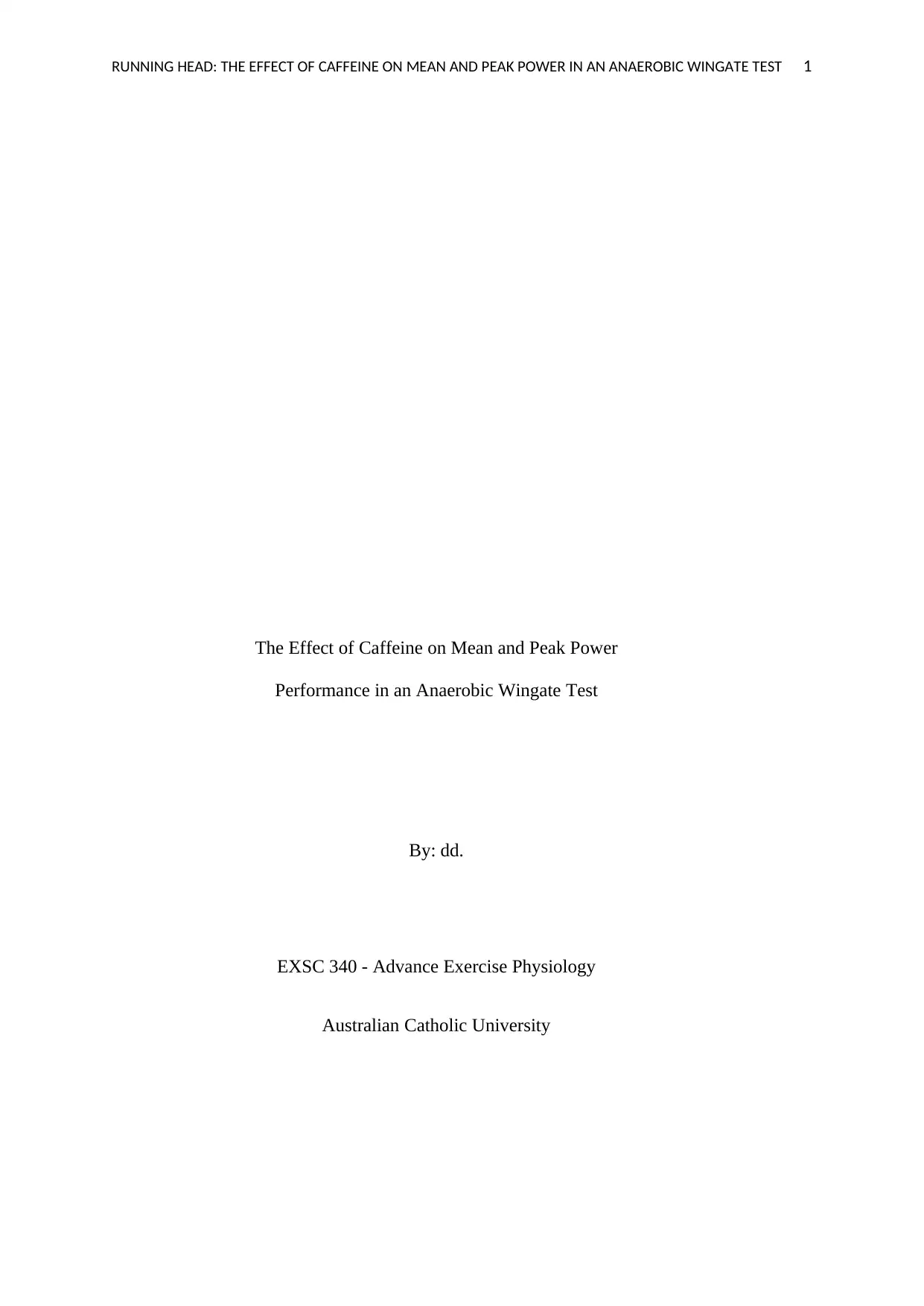
RUNNING HEAD: THE EFFECT OF CAFFEINE ON MEAN AND PEAK POWER IN AN ANAEROBIC WINGATE TEST 1
The Effect of Caffeine on Mean and Peak Power
Performance in an Anaerobic Wingate Test
By: dd.
EXSC 340 - Advance Exercise Physiology
Australian Catholic University
The Effect of Caffeine on Mean and Peak Power
Performance in an Anaerobic Wingate Test
By: dd.
EXSC 340 - Advance Exercise Physiology
Australian Catholic University
Paraphrase This Document
Need a fresh take? Get an instant paraphrase of this document with our AI Paraphraser
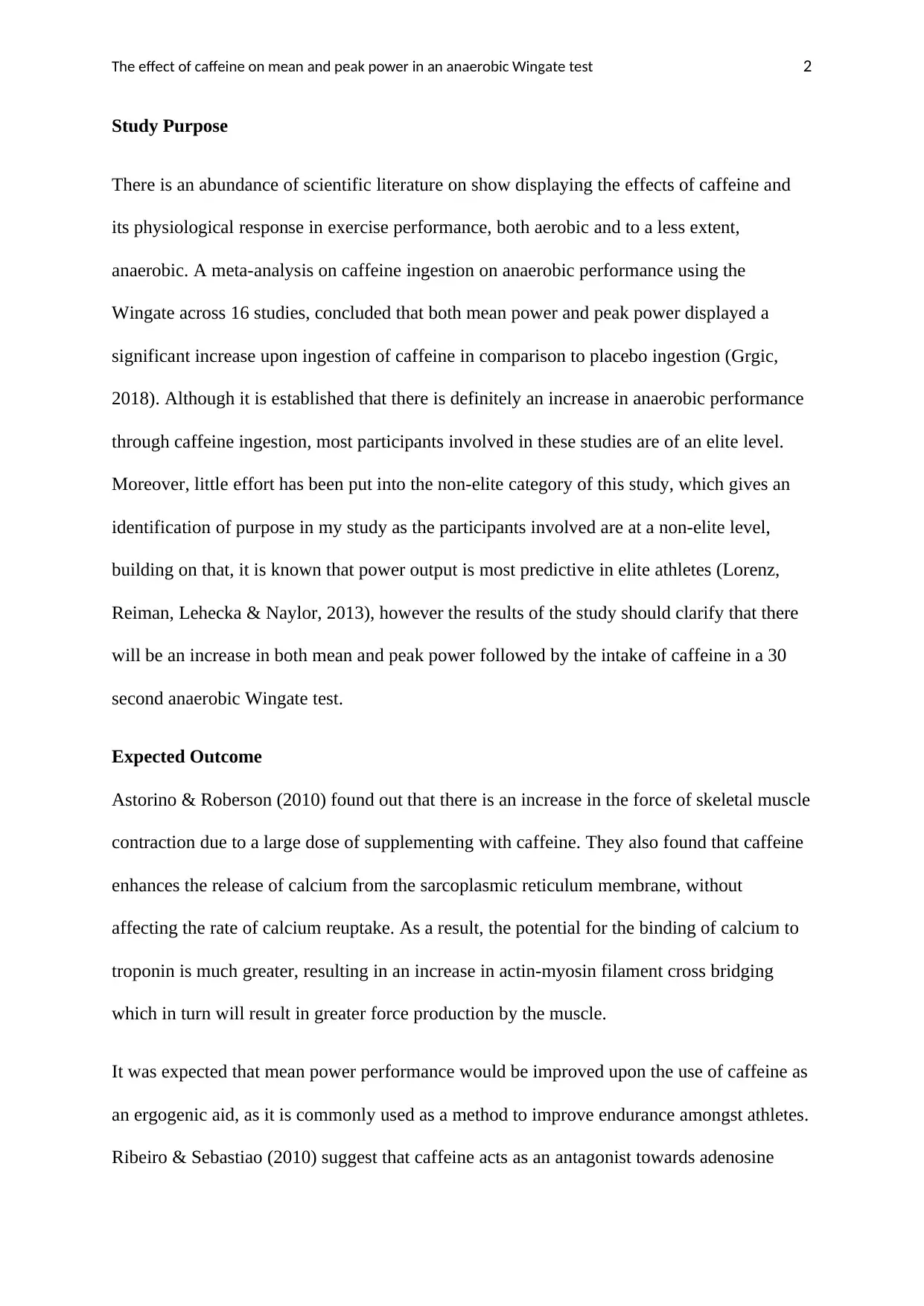
The effect of caffeine on mean and peak power in an anaerobic Wingate test 2
Study Purpose
There is an abundance of scientific literature on show displaying the effects of caffeine and
its physiological response in exercise performance, both aerobic and to a less extent,
anaerobic. A meta-analysis on caffeine ingestion on anaerobic performance using the
Wingate across 16 studies, concluded that both mean power and peak power displayed a
significant increase upon ingestion of caffeine in comparison to placebo ingestion (Grgic,
2018). Although it is established that there is definitely an increase in anaerobic performance
through caffeine ingestion, most participants involved in these studies are of an elite level.
Moreover, little effort has been put into the non-elite category of this study, which gives an
identification of purpose in my study as the participants involved are at a non-elite level,
building on that, it is known that power output is most predictive in elite athletes (Lorenz,
Reiman, Lehecka & Naylor, 2013), however the results of the study should clarify that there
will be an increase in both mean and peak power followed by the intake of caffeine in a 30
second anaerobic Wingate test.
Expected Outcome
Astorino & Roberson (2010) found out that there is an increase in the force of skeletal muscle
contraction due to a large dose of supplementing with caffeine. They also found that caffeine
enhances the release of calcium from the sarcoplasmic reticulum membrane, without
affecting the rate of calcium reuptake. As a result, the potential for the binding of calcium to
troponin is much greater, resulting in an increase in actin-myosin filament cross bridging
which in turn will result in greater force production by the muscle.
It was expected that mean power performance would be improved upon the use of caffeine as
an ergogenic aid, as it is commonly used as a method to improve endurance amongst athletes.
Ribeiro & Sebastiao (2010) suggest that caffeine acts as an antagonist towards adenosine
Study Purpose
There is an abundance of scientific literature on show displaying the effects of caffeine and
its physiological response in exercise performance, both aerobic and to a less extent,
anaerobic. A meta-analysis on caffeine ingestion on anaerobic performance using the
Wingate across 16 studies, concluded that both mean power and peak power displayed a
significant increase upon ingestion of caffeine in comparison to placebo ingestion (Grgic,
2018). Although it is established that there is definitely an increase in anaerobic performance
through caffeine ingestion, most participants involved in these studies are of an elite level.
Moreover, little effort has been put into the non-elite category of this study, which gives an
identification of purpose in my study as the participants involved are at a non-elite level,
building on that, it is known that power output is most predictive in elite athletes (Lorenz,
Reiman, Lehecka & Naylor, 2013), however the results of the study should clarify that there
will be an increase in both mean and peak power followed by the intake of caffeine in a 30
second anaerobic Wingate test.
Expected Outcome
Astorino & Roberson (2010) found out that there is an increase in the force of skeletal muscle
contraction due to a large dose of supplementing with caffeine. They also found that caffeine
enhances the release of calcium from the sarcoplasmic reticulum membrane, without
affecting the rate of calcium reuptake. As a result, the potential for the binding of calcium to
troponin is much greater, resulting in an increase in actin-myosin filament cross bridging
which in turn will result in greater force production by the muscle.
It was expected that mean power performance would be improved upon the use of caffeine as
an ergogenic aid, as it is commonly used as a method to improve endurance amongst athletes.
Ribeiro & Sebastiao (2010) suggest that caffeine acts as an antagonist towards adenosine
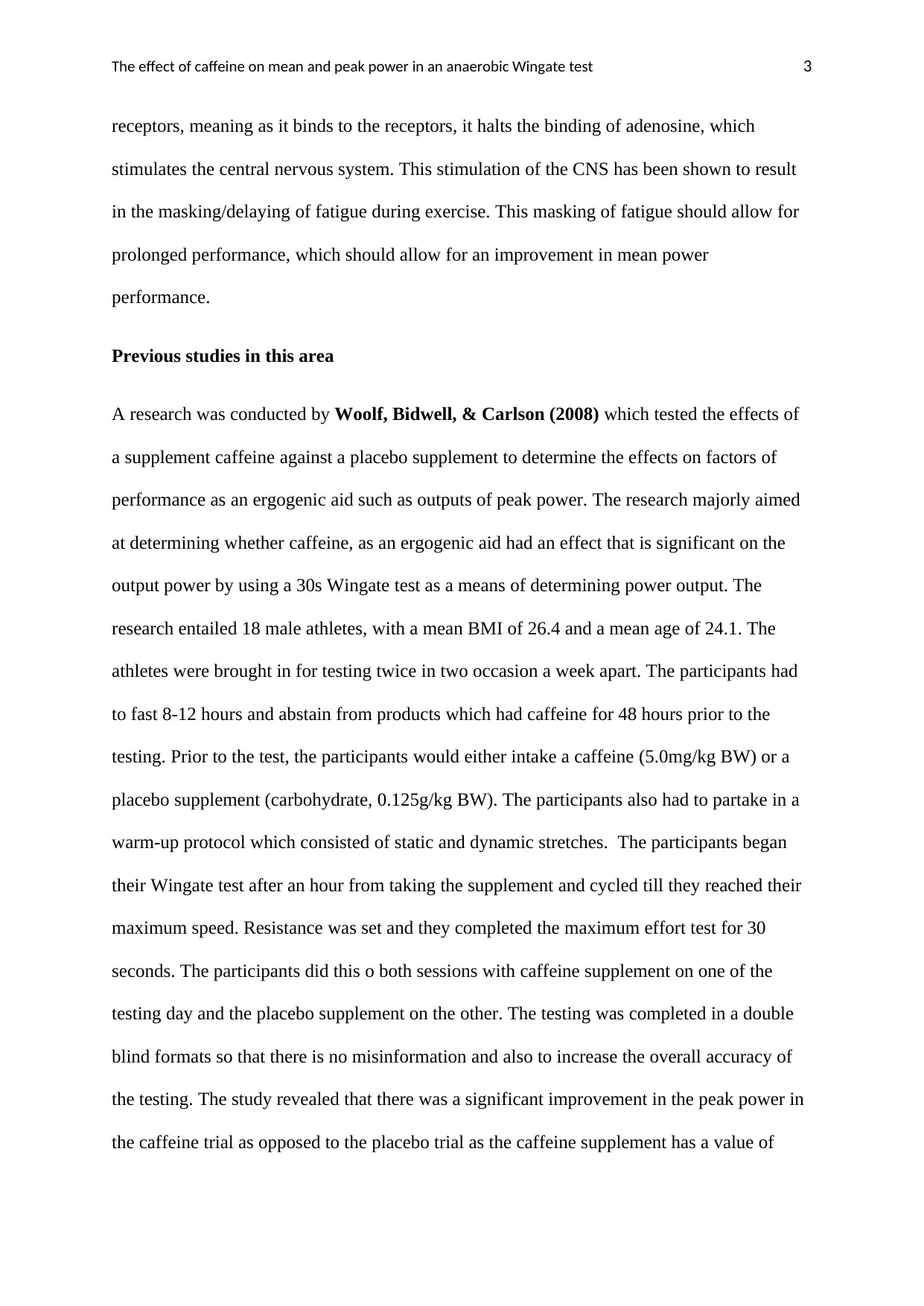
The effect of caffeine on mean and peak power in an anaerobic Wingate test 3
receptors, meaning as it binds to the receptors, it halts the binding of adenosine, which
stimulates the central nervous system. This stimulation of the CNS has been shown to result
in the masking/delaying of fatigue during exercise. This masking of fatigue should allow for
prolonged performance, which should allow for an improvement in mean power
performance.
Previous studies in this area
A research was conducted by Woolf, Bidwell, & Carlson (2008) which tested the effects of
a supplement caffeine against a placebo supplement to determine the effects on factors of
performance as an ergogenic aid such as outputs of peak power. The research majorly aimed
at determining whether caffeine, as an ergogenic aid had an effect that is significant on the
output power by using a 30s Wingate test as a means of determining power output. The
research entailed 18 male athletes, with a mean BMI of 26.4 and a mean age of 24.1. The
athletes were brought in for testing twice in two occasion a week apart. The participants had
to fast 8-12 hours and abstain from products which had caffeine for 48 hours prior to the
testing. Prior to the test, the participants would either intake a caffeine (5.0mg/kg BW) or a
placebo supplement (carbohydrate, 0.125g/kg BW). The participants also had to partake in a
warm-up protocol which consisted of static and dynamic stretches. The participants began
their Wingate test after an hour from taking the supplement and cycled till they reached their
maximum speed. Resistance was set and they completed the maximum effort test for 30
seconds. The participants did this o both sessions with caffeine supplement on one of the
testing day and the placebo supplement on the other. The testing was completed in a double
blind formats so that there is no misinformation and also to increase the overall accuracy of
the testing. The study revealed that there was a significant improvement in the peak power in
the caffeine trial as opposed to the placebo trial as the caffeine supplement has a value of
receptors, meaning as it binds to the receptors, it halts the binding of adenosine, which
stimulates the central nervous system. This stimulation of the CNS has been shown to result
in the masking/delaying of fatigue during exercise. This masking of fatigue should allow for
prolonged performance, which should allow for an improvement in mean power
performance.
Previous studies in this area
A research was conducted by Woolf, Bidwell, & Carlson (2008) which tested the effects of
a supplement caffeine against a placebo supplement to determine the effects on factors of
performance as an ergogenic aid such as outputs of peak power. The research majorly aimed
at determining whether caffeine, as an ergogenic aid had an effect that is significant on the
output power by using a 30s Wingate test as a means of determining power output. The
research entailed 18 male athletes, with a mean BMI of 26.4 and a mean age of 24.1. The
athletes were brought in for testing twice in two occasion a week apart. The participants had
to fast 8-12 hours and abstain from products which had caffeine for 48 hours prior to the
testing. Prior to the test, the participants would either intake a caffeine (5.0mg/kg BW) or a
placebo supplement (carbohydrate, 0.125g/kg BW). The participants also had to partake in a
warm-up protocol which consisted of static and dynamic stretches. The participants began
their Wingate test after an hour from taking the supplement and cycled till they reached their
maximum speed. Resistance was set and they completed the maximum effort test for 30
seconds. The participants did this o both sessions with caffeine supplement on one of the
testing day and the placebo supplement on the other. The testing was completed in a double
blind formats so that there is no misinformation and also to increase the overall accuracy of
the testing. The study revealed that there was a significant improvement in the peak power in
the caffeine trial as opposed to the placebo trial as the caffeine supplement has a value of
⊘ This is a preview!⊘
Do you want full access?
Subscribe today to unlock all pages.

Trusted by 1+ million students worldwide
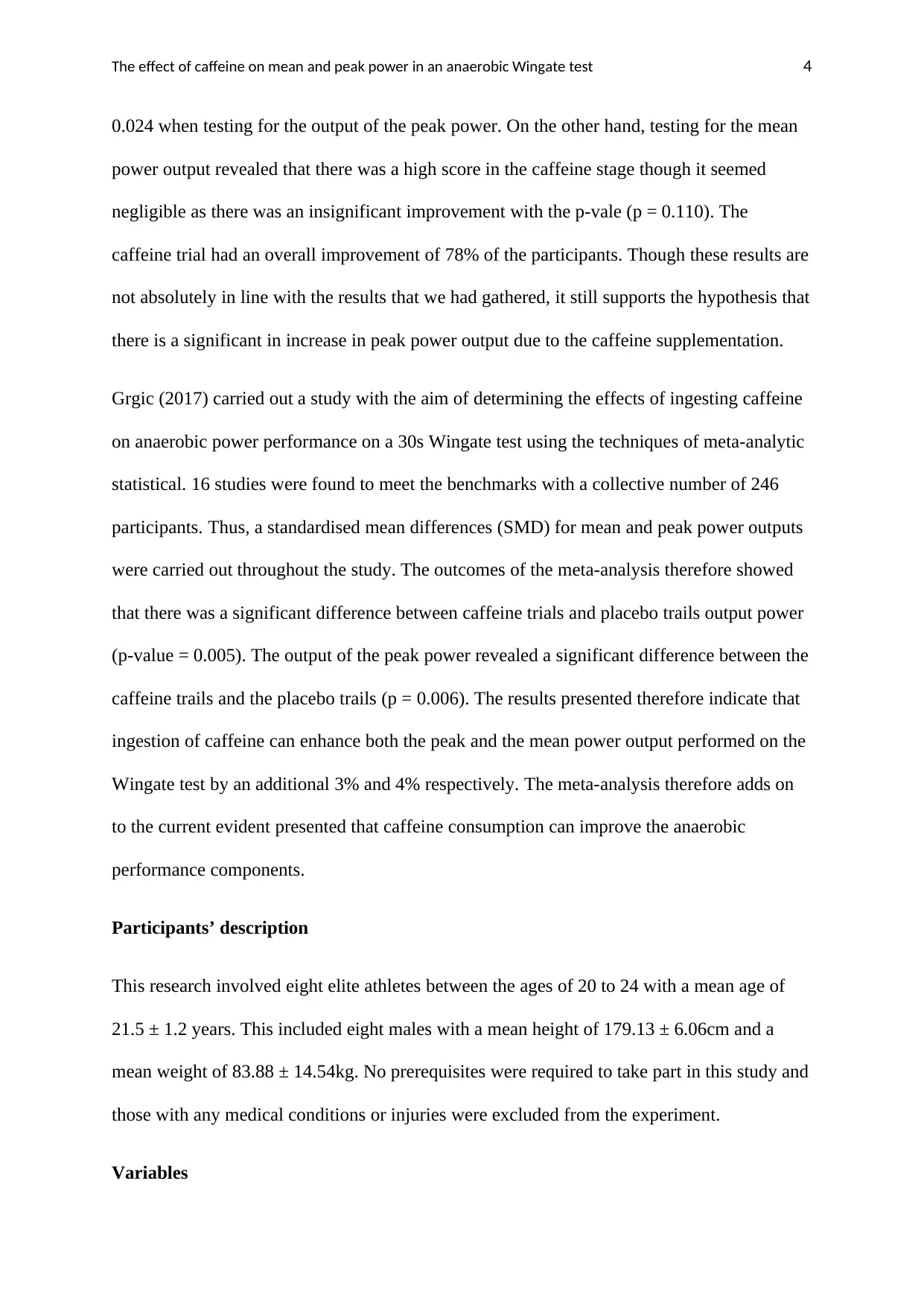
The effect of caffeine on mean and peak power in an anaerobic Wingate test 4
0.024 when testing for the output of the peak power. On the other hand, testing for the mean
power output revealed that there was a high score in the caffeine stage though it seemed
negligible as there was an insignificant improvement with the p-vale (p = 0.110). The
caffeine trial had an overall improvement of 78% of the participants. Though these results are
not absolutely in line with the results that we had gathered, it still supports the hypothesis that
there is a significant in increase in peak power output due to the caffeine supplementation.
Grgic (2017) carried out a study with the aim of determining the effects of ingesting caffeine
on anaerobic power performance on a 30s Wingate test using the techniques of meta-analytic
statistical. 16 studies were found to meet the benchmarks with a collective number of 246
participants. Thus, a standardised mean differences (SMD) for mean and peak power outputs
were carried out throughout the study. The outcomes of the meta-analysis therefore showed
that there was a significant difference between caffeine trials and placebo trails output power
(p-value = 0.005). The output of the peak power revealed a significant difference between the
caffeine trails and the placebo trails (p = 0.006). The results presented therefore indicate that
ingestion of caffeine can enhance both the peak and the mean power output performed on the
Wingate test by an additional 3% and 4% respectively. The meta-analysis therefore adds on
to the current evident presented that caffeine consumption can improve the anaerobic
performance components.
Participants’ description
This research involved eight elite athletes between the ages of 20 to 24 with a mean age of
21.5 ± 1.2 years. This included eight males with a mean height of 179.13 ± 6.06cm and a
mean weight of 83.88 ± 14.54kg. No prerequisites were required to take part in this study and
those with any medical conditions or injuries were excluded from the experiment.
Variables
0.024 when testing for the output of the peak power. On the other hand, testing for the mean
power output revealed that there was a high score in the caffeine stage though it seemed
negligible as there was an insignificant improvement with the p-vale (p = 0.110). The
caffeine trial had an overall improvement of 78% of the participants. Though these results are
not absolutely in line with the results that we had gathered, it still supports the hypothesis that
there is a significant in increase in peak power output due to the caffeine supplementation.
Grgic (2017) carried out a study with the aim of determining the effects of ingesting caffeine
on anaerobic power performance on a 30s Wingate test using the techniques of meta-analytic
statistical. 16 studies were found to meet the benchmarks with a collective number of 246
participants. Thus, a standardised mean differences (SMD) for mean and peak power outputs
were carried out throughout the study. The outcomes of the meta-analysis therefore showed
that there was a significant difference between caffeine trials and placebo trails output power
(p-value = 0.005). The output of the peak power revealed a significant difference between the
caffeine trails and the placebo trails (p = 0.006). The results presented therefore indicate that
ingestion of caffeine can enhance both the peak and the mean power output performed on the
Wingate test by an additional 3% and 4% respectively. The meta-analysis therefore adds on
to the current evident presented that caffeine consumption can improve the anaerobic
performance components.
Participants’ description
This research involved eight elite athletes between the ages of 20 to 24 with a mean age of
21.5 ± 1.2 years. This included eight males with a mean height of 179.13 ± 6.06cm and a
mean weight of 83.88 ± 14.54kg. No prerequisites were required to take part in this study and
those with any medical conditions or injuries were excluded from the experiment.
Variables
Paraphrase This Document
Need a fresh take? Get an instant paraphrase of this document with our AI Paraphraser
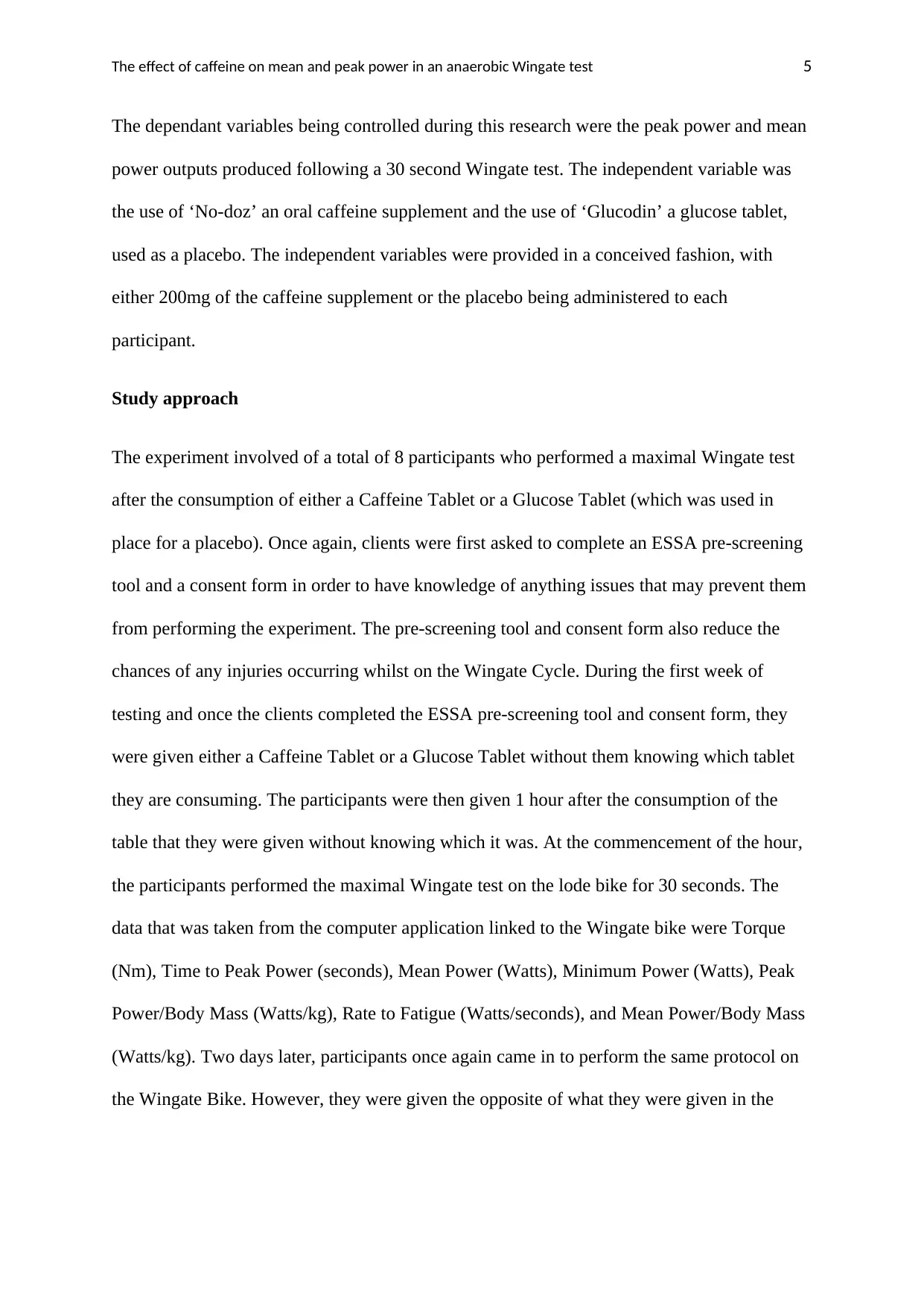
The effect of caffeine on mean and peak power in an anaerobic Wingate test 5
The dependant variables being controlled during this research were the peak power and mean
power outputs produced following a 30 second Wingate test. The independent variable was
the use of ‘No-doz’ an oral caffeine supplement and the use of ‘Glucodin’ a glucose tablet,
used as a placebo. The independent variables were provided in a conceived fashion, with
either 200mg of the caffeine supplement or the placebo being administered to each
participant.
Study approach
The experiment involved of a total of 8 participants who performed a maximal Wingate test
after the consumption of either a Caffeine Tablet or a Glucose Tablet (which was used in
place for a placebo). Once again, clients were first asked to complete an ESSA pre-screening
tool and a consent form in order to have knowledge of anything issues that may prevent them
from performing the experiment. The pre-screening tool and consent form also reduce the
chances of any injuries occurring whilst on the Wingate Cycle. During the first week of
testing and once the clients completed the ESSA pre-screening tool and consent form, they
were given either a Caffeine Tablet or a Glucose Tablet without them knowing which tablet
they are consuming. The participants were then given 1 hour after the consumption of the
table that they were given without knowing which it was. At the commencement of the hour,
the participants performed the maximal Wingate test on the lode bike for 30 seconds. The
data that was taken from the computer application linked to the Wingate bike were Torque
(Nm), Time to Peak Power (seconds), Mean Power (Watts), Minimum Power (Watts), Peak
Power/Body Mass (Watts/kg), Rate to Fatigue (Watts/seconds), and Mean Power/Body Mass
(Watts/kg). Two days later, participants once again came in to perform the same protocol on
the Wingate Bike. However, they were given the opposite of what they were given in the
The dependant variables being controlled during this research were the peak power and mean
power outputs produced following a 30 second Wingate test. The independent variable was
the use of ‘No-doz’ an oral caffeine supplement and the use of ‘Glucodin’ a glucose tablet,
used as a placebo. The independent variables were provided in a conceived fashion, with
either 200mg of the caffeine supplement or the placebo being administered to each
participant.
Study approach
The experiment involved of a total of 8 participants who performed a maximal Wingate test
after the consumption of either a Caffeine Tablet or a Glucose Tablet (which was used in
place for a placebo). Once again, clients were first asked to complete an ESSA pre-screening
tool and a consent form in order to have knowledge of anything issues that may prevent them
from performing the experiment. The pre-screening tool and consent form also reduce the
chances of any injuries occurring whilst on the Wingate Cycle. During the first week of
testing and once the clients completed the ESSA pre-screening tool and consent form, they
were given either a Caffeine Tablet or a Glucose Tablet without them knowing which tablet
they are consuming. The participants were then given 1 hour after the consumption of the
table that they were given without knowing which it was. At the commencement of the hour,
the participants performed the maximal Wingate test on the lode bike for 30 seconds. The
data that was taken from the computer application linked to the Wingate bike were Torque
(Nm), Time to Peak Power (seconds), Mean Power (Watts), Minimum Power (Watts), Peak
Power/Body Mass (Watts/kg), Rate to Fatigue (Watts/seconds), and Mean Power/Body Mass
(Watts/kg). Two days later, participants once again came in to perform the same protocol on
the Wingate Bike. However, they were given the opposite of what they were given in the
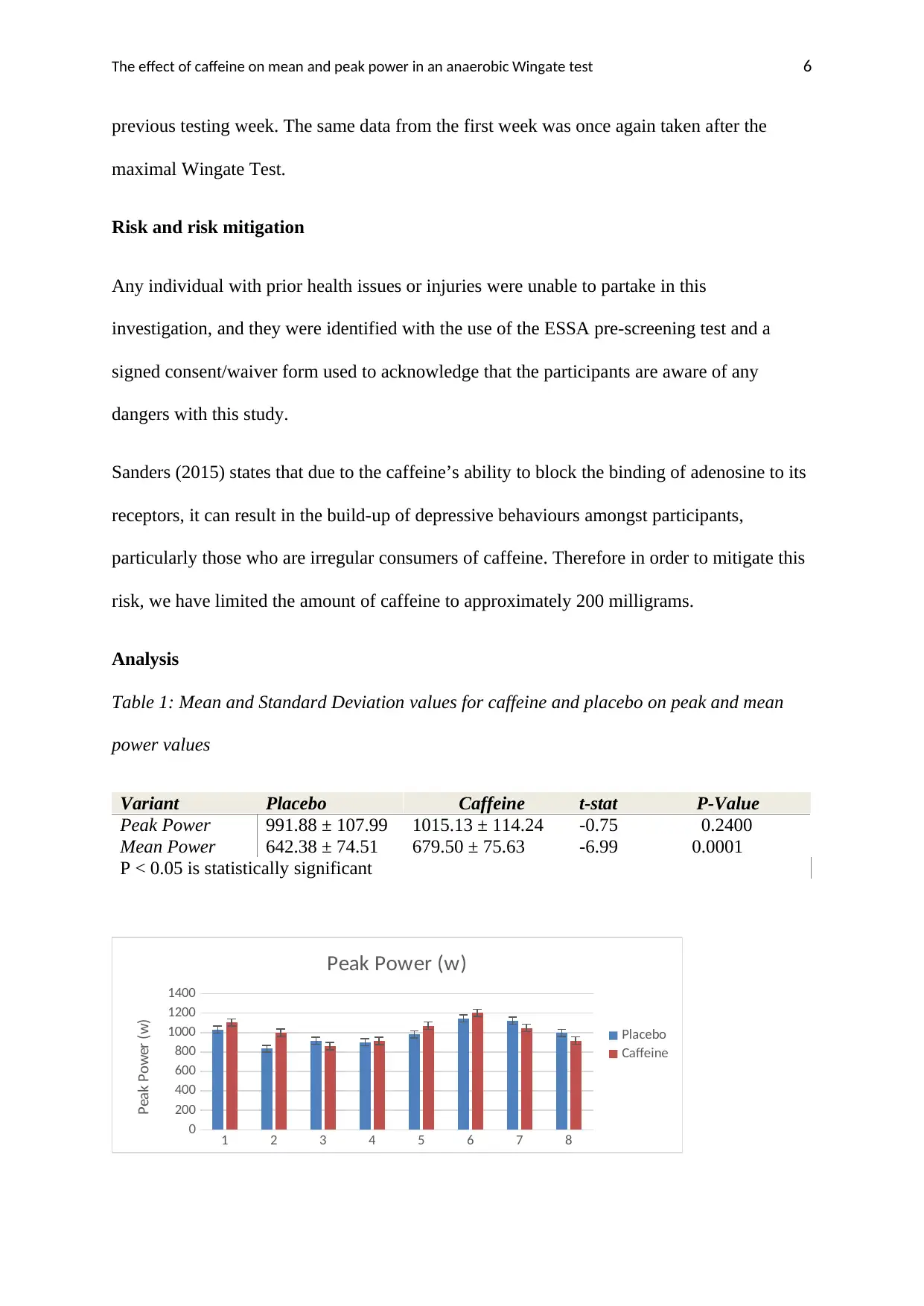
The effect of caffeine on mean and peak power in an anaerobic Wingate test 6
previous testing week. The same data from the first week was once again taken after the
maximal Wingate Test.
Risk and risk mitigation
Any individual with prior health issues or injuries were unable to partake in this
investigation, and they were identified with the use of the ESSA pre-screening test and a
signed consent/waiver form used to acknowledge that the participants are aware of any
dangers with this study.
Sanders (2015) states that due to the caffeine’s ability to block the binding of adenosine to its
receptors, it can result in the build-up of depressive behaviours amongst participants,
particularly those who are irregular consumers of caffeine. Therefore in order to mitigate this
risk, we have limited the amount of caffeine to approximately 200 milligrams.
Analysis
Table 1: Mean and Standard Deviation values for caffeine and placebo on peak and mean
power values
Variant Placebo Caffeine t-stat P-Value
Peak Power 991.88 ± 107.99 1015.13 ± 114.24 -0.75 0.2400
Mean Power 642.38 ± 74.51 679.50 ± 75.63 -6.99 0.0001
P < 0.05 is statistically significant
1 2 3 4 5 6 7 8
0
200
400
600
800
1000
1200
1400
Peak Power (w)
Placebo
Caffeine
Peak Power (w)
previous testing week. The same data from the first week was once again taken after the
maximal Wingate Test.
Risk and risk mitigation
Any individual with prior health issues or injuries were unable to partake in this
investigation, and they were identified with the use of the ESSA pre-screening test and a
signed consent/waiver form used to acknowledge that the participants are aware of any
dangers with this study.
Sanders (2015) states that due to the caffeine’s ability to block the binding of adenosine to its
receptors, it can result in the build-up of depressive behaviours amongst participants,
particularly those who are irregular consumers of caffeine. Therefore in order to mitigate this
risk, we have limited the amount of caffeine to approximately 200 milligrams.
Analysis
Table 1: Mean and Standard Deviation values for caffeine and placebo on peak and mean
power values
Variant Placebo Caffeine t-stat P-Value
Peak Power 991.88 ± 107.99 1015.13 ± 114.24 -0.75 0.2400
Mean Power 642.38 ± 74.51 679.50 ± 75.63 -6.99 0.0001
P < 0.05 is statistically significant
1 2 3 4 5 6 7 8
0
200
400
600
800
1000
1200
1400
Peak Power (w)
Placebo
Caffeine
Peak Power (w)
⊘ This is a preview!⊘
Do you want full access?
Subscribe today to unlock all pages.

Trusted by 1+ million students worldwide
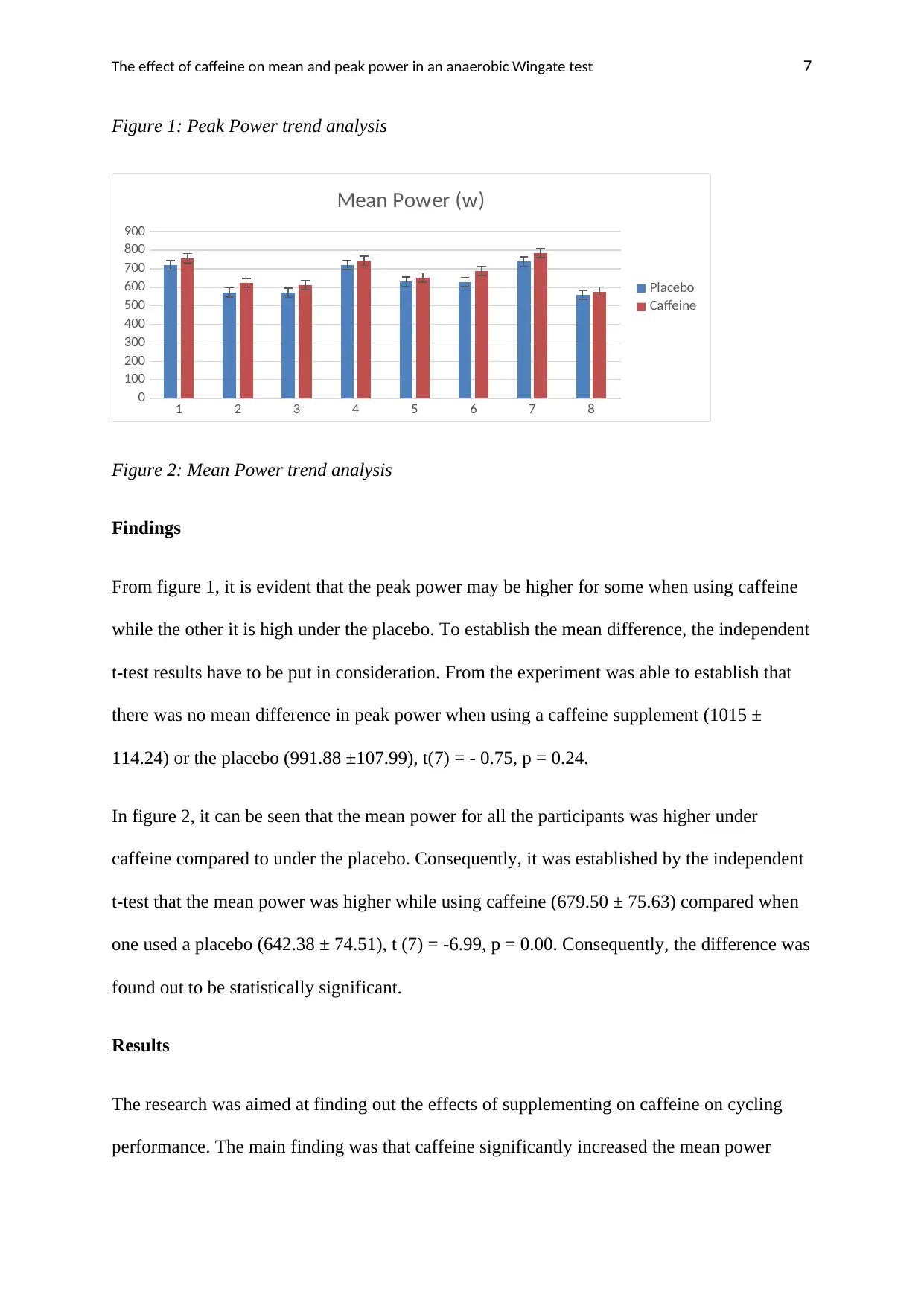
The effect of caffeine on mean and peak power in an anaerobic Wingate test 7
Figure 1: Peak Power trend analysis
1 2 3 4 5 6 7 8
0
100
200
300
400
500
600
700
800
900
Mean Power (w)
Placebo
Caffeine
Figure 2: Mean Power trend analysis
Findings
From figure 1, it is evident that the peak power may be higher for some when using caffeine
while the other it is high under the placebo. To establish the mean difference, the independent
t-test results have to be put in consideration. From the experiment was able to establish that
there was no mean difference in peak power when using a caffeine supplement (1015 ±
114.24) or the placebo (991.88 ±107.99), t(7) = - 0.75, p = 0.24.
In figure 2, it can be seen that the mean power for all the participants was higher under
caffeine compared to under the placebo. Consequently, it was established by the independent
t-test that the mean power was higher while using caffeine (679.50 ± 75.63) compared when
one used a placebo (642.38 ± 74.51), t (7) = -6.99, p = 0.00. Consequently, the difference was
found out to be statistically significant.
Results
The research was aimed at finding out the effects of supplementing on caffeine on cycling
performance. The main finding was that caffeine significantly increased the mean power
Figure 1: Peak Power trend analysis
1 2 3 4 5 6 7 8
0
100
200
300
400
500
600
700
800
900
Mean Power (w)
Placebo
Caffeine
Figure 2: Mean Power trend analysis
Findings
From figure 1, it is evident that the peak power may be higher for some when using caffeine
while the other it is high under the placebo. To establish the mean difference, the independent
t-test results have to be put in consideration. From the experiment was able to establish that
there was no mean difference in peak power when using a caffeine supplement (1015 ±
114.24) or the placebo (991.88 ±107.99), t(7) = - 0.75, p = 0.24.
In figure 2, it can be seen that the mean power for all the participants was higher under
caffeine compared to under the placebo. Consequently, it was established by the independent
t-test that the mean power was higher while using caffeine (679.50 ± 75.63) compared when
one used a placebo (642.38 ± 74.51), t (7) = -6.99, p = 0.00. Consequently, the difference was
found out to be statistically significant.
Results
The research was aimed at finding out the effects of supplementing on caffeine on cycling
performance. The main finding was that caffeine significantly increased the mean power
Paraphrase This Document
Need a fresh take? Get an instant paraphrase of this document with our AI Paraphraser
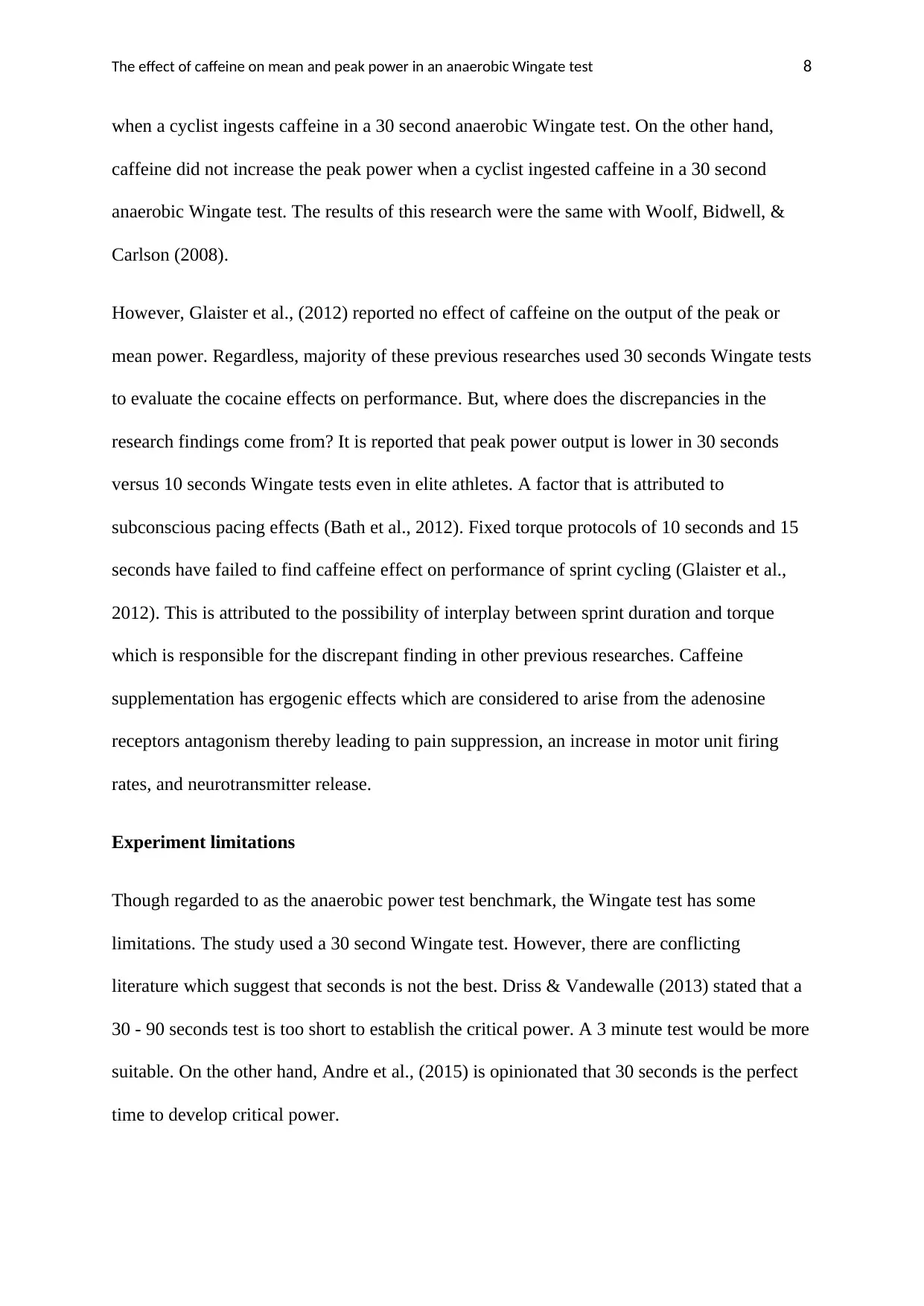
The effect of caffeine on mean and peak power in an anaerobic Wingate test 8
when a cyclist ingests caffeine in a 30 second anaerobic Wingate test. On the other hand,
caffeine did not increase the peak power when a cyclist ingested caffeine in a 30 second
anaerobic Wingate test. The results of this research were the same with Woolf, Bidwell, &
Carlson (2008).
However, Glaister et al., (2012) reported no effect of caffeine on the output of the peak or
mean power. Regardless, majority of these previous researches used 30 seconds Wingate tests
to evaluate the cocaine effects on performance. But, where does the discrepancies in the
research findings come from? It is reported that peak power output is lower in 30 seconds
versus 10 seconds Wingate tests even in elite athletes. A factor that is attributed to
subconscious pacing effects (Bath et al., 2012). Fixed torque protocols of 10 seconds and 15
seconds have failed to find caffeine effect on performance of sprint cycling (Glaister et al.,
2012). This is attributed to the possibility of interplay between sprint duration and torque
which is responsible for the discrepant finding in other previous researches. Caffeine
supplementation has ergogenic effects which are considered to arise from the adenosine
receptors antagonism thereby leading to pain suppression, an increase in motor unit firing
rates, and neurotransmitter release.
Experiment limitations
Though regarded to as the anaerobic power test benchmark, the Wingate test has some
limitations. The study used a 30 second Wingate test. However, there are conflicting
literature which suggest that seconds is not the best. Driss & Vandewalle (2013) stated that a
30 - 90 seconds test is too short to establish the critical power. A 3 minute test would be more
suitable. On the other hand, Andre et al., (2015) is opinionated that 30 seconds is the perfect
time to develop critical power.
when a cyclist ingests caffeine in a 30 second anaerobic Wingate test. On the other hand,
caffeine did not increase the peak power when a cyclist ingested caffeine in a 30 second
anaerobic Wingate test. The results of this research were the same with Woolf, Bidwell, &
Carlson (2008).
However, Glaister et al., (2012) reported no effect of caffeine on the output of the peak or
mean power. Regardless, majority of these previous researches used 30 seconds Wingate tests
to evaluate the cocaine effects on performance. But, where does the discrepancies in the
research findings come from? It is reported that peak power output is lower in 30 seconds
versus 10 seconds Wingate tests even in elite athletes. A factor that is attributed to
subconscious pacing effects (Bath et al., 2012). Fixed torque protocols of 10 seconds and 15
seconds have failed to find caffeine effect on performance of sprint cycling (Glaister et al.,
2012). This is attributed to the possibility of interplay between sprint duration and torque
which is responsible for the discrepant finding in other previous researches. Caffeine
supplementation has ergogenic effects which are considered to arise from the adenosine
receptors antagonism thereby leading to pain suppression, an increase in motor unit firing
rates, and neurotransmitter release.
Experiment limitations
Though regarded to as the anaerobic power test benchmark, the Wingate test has some
limitations. The study used a 30 second Wingate test. However, there are conflicting
literature which suggest that seconds is not the best. Driss & Vandewalle (2013) stated that a
30 - 90 seconds test is too short to establish the critical power. A 3 minute test would be more
suitable. On the other hand, Andre et al., (2015) is opinionated that 30 seconds is the perfect
time to develop critical power.
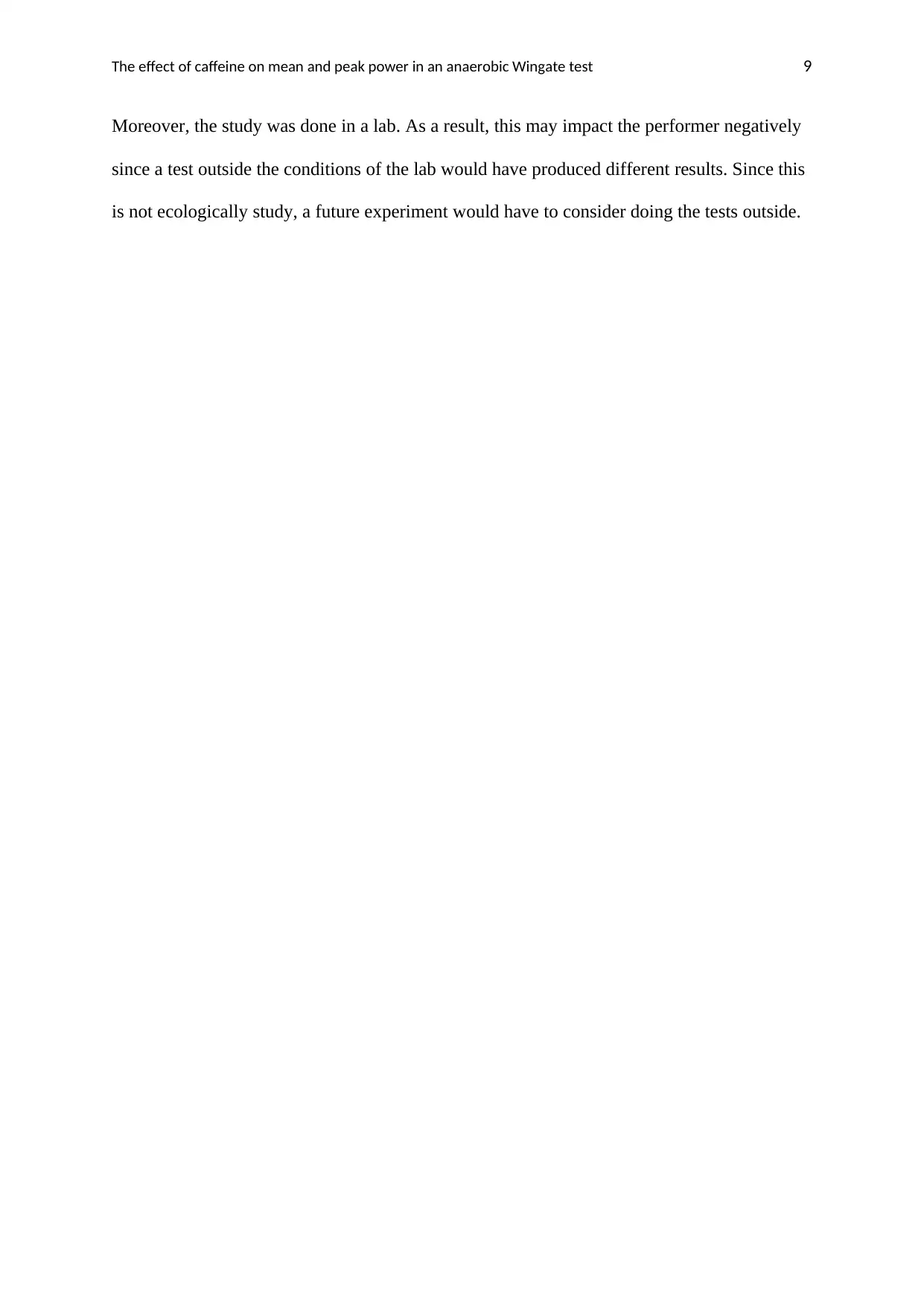
The effect of caffeine on mean and peak power in an anaerobic Wingate test 9
Moreover, the study was done in a lab. As a result, this may impact the performer negatively
since a test outside the conditions of the lab would have produced different results. Since this
is not ecologically study, a future experiment would have to consider doing the tests outside.
Moreover, the study was done in a lab. As a result, this may impact the performer negatively
since a test outside the conditions of the lab would have produced different results. Since this
is not ecologically study, a future experiment would have to consider doing the tests outside.
⊘ This is a preview!⊘
Do you want full access?
Subscribe today to unlock all pages.

Trusted by 1+ million students worldwide
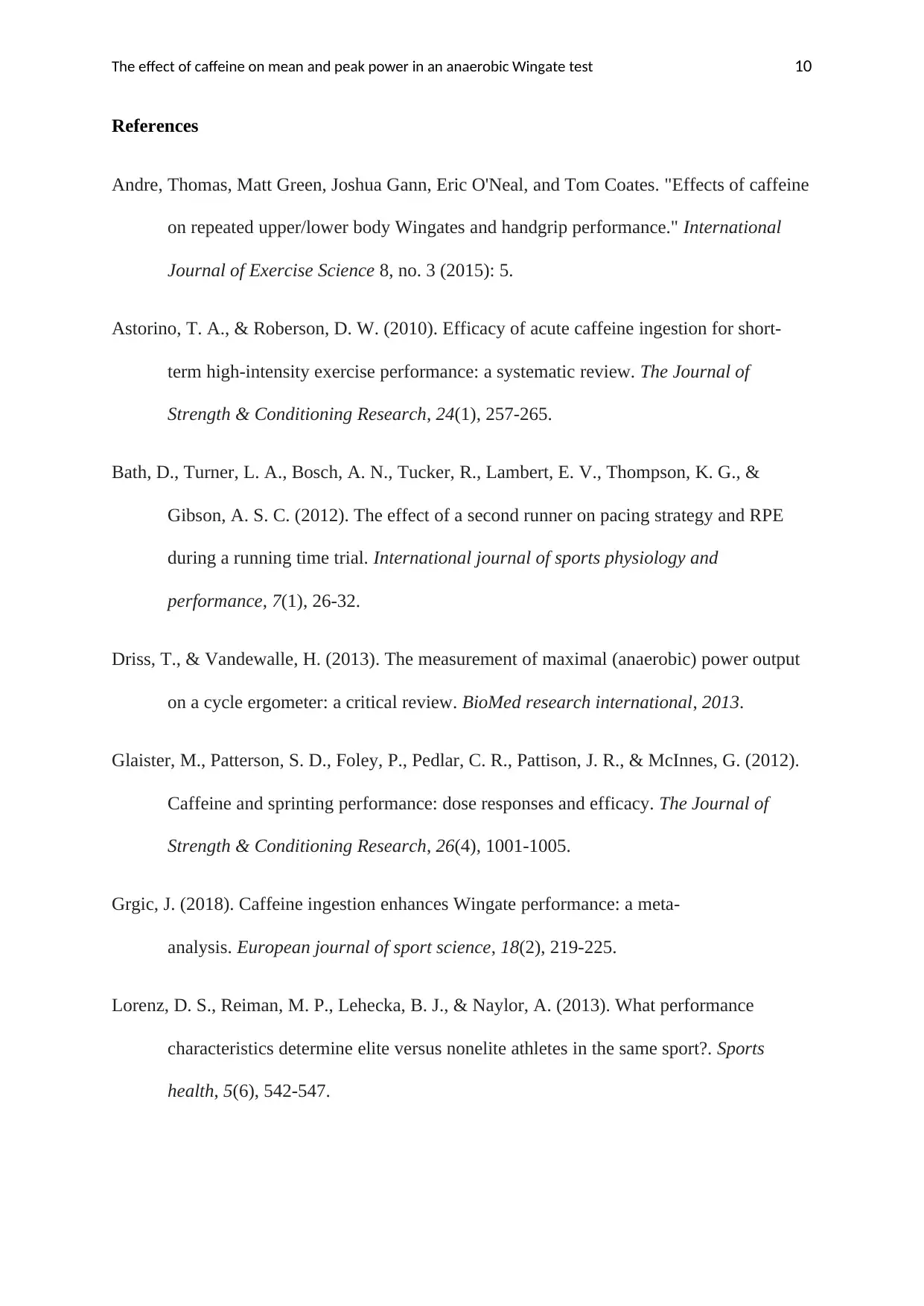
The effect of caffeine on mean and peak power in an anaerobic Wingate test 10
References
Andre, Thomas, Matt Green, Joshua Gann, Eric O'Neal, and Tom Coates. "Effects of caffeine
on repeated upper/lower body Wingates and handgrip performance." International
Journal of Exercise Science 8, no. 3 (2015): 5.
Astorino, T. A., & Roberson, D. W. (2010). Efficacy of acute caffeine ingestion for short-
term high-intensity exercise performance: a systematic review. The Journal of
Strength & Conditioning Research, 24(1), 257-265.
Bath, D., Turner, L. A., Bosch, A. N., Tucker, R., Lambert, E. V., Thompson, K. G., &
Gibson, A. S. C. (2012). The effect of a second runner on pacing strategy and RPE
during a running time trial. International journal of sports physiology and
performance, 7(1), 26-32.
Driss, T., & Vandewalle, H. (2013). The measurement of maximal (anaerobic) power output
on a cycle ergometer: a critical review. BioMed research international, 2013.
Glaister, M., Patterson, S. D., Foley, P., Pedlar, C. R., Pattison, J. R., & McInnes, G. (2012).
Caffeine and sprinting performance: dose responses and efficacy. The Journal of
Strength & Conditioning Research, 26(4), 1001-1005.
Grgic, J. (2018). Caffeine ingestion enhances Wingate performance: a meta-
analysis. European journal of sport science, 18(2), 219-225.
Lorenz, D. S., Reiman, M. P., Lehecka, B. J., & Naylor, A. (2013). What performance
characteristics determine elite versus nonelite athletes in the same sport?. Sports
health, 5(6), 542-547.
References
Andre, Thomas, Matt Green, Joshua Gann, Eric O'Neal, and Tom Coates. "Effects of caffeine
on repeated upper/lower body Wingates and handgrip performance." International
Journal of Exercise Science 8, no. 3 (2015): 5.
Astorino, T. A., & Roberson, D. W. (2010). Efficacy of acute caffeine ingestion for short-
term high-intensity exercise performance: a systematic review. The Journal of
Strength & Conditioning Research, 24(1), 257-265.
Bath, D., Turner, L. A., Bosch, A. N., Tucker, R., Lambert, E. V., Thompson, K. G., &
Gibson, A. S. C. (2012). The effect of a second runner on pacing strategy and RPE
during a running time trial. International journal of sports physiology and
performance, 7(1), 26-32.
Driss, T., & Vandewalle, H. (2013). The measurement of maximal (anaerobic) power output
on a cycle ergometer: a critical review. BioMed research international, 2013.
Glaister, M., Patterson, S. D., Foley, P., Pedlar, C. R., Pattison, J. R., & McInnes, G. (2012).
Caffeine and sprinting performance: dose responses and efficacy. The Journal of
Strength & Conditioning Research, 26(4), 1001-1005.
Grgic, J. (2018). Caffeine ingestion enhances Wingate performance: a meta-
analysis. European journal of sport science, 18(2), 219-225.
Lorenz, D. S., Reiman, M. P., Lehecka, B. J., & Naylor, A. (2013). What performance
characteristics determine elite versus nonelite athletes in the same sport?. Sports
health, 5(6), 542-547.
Paraphrase This Document
Need a fresh take? Get an instant paraphrase of this document with our AI Paraphraser
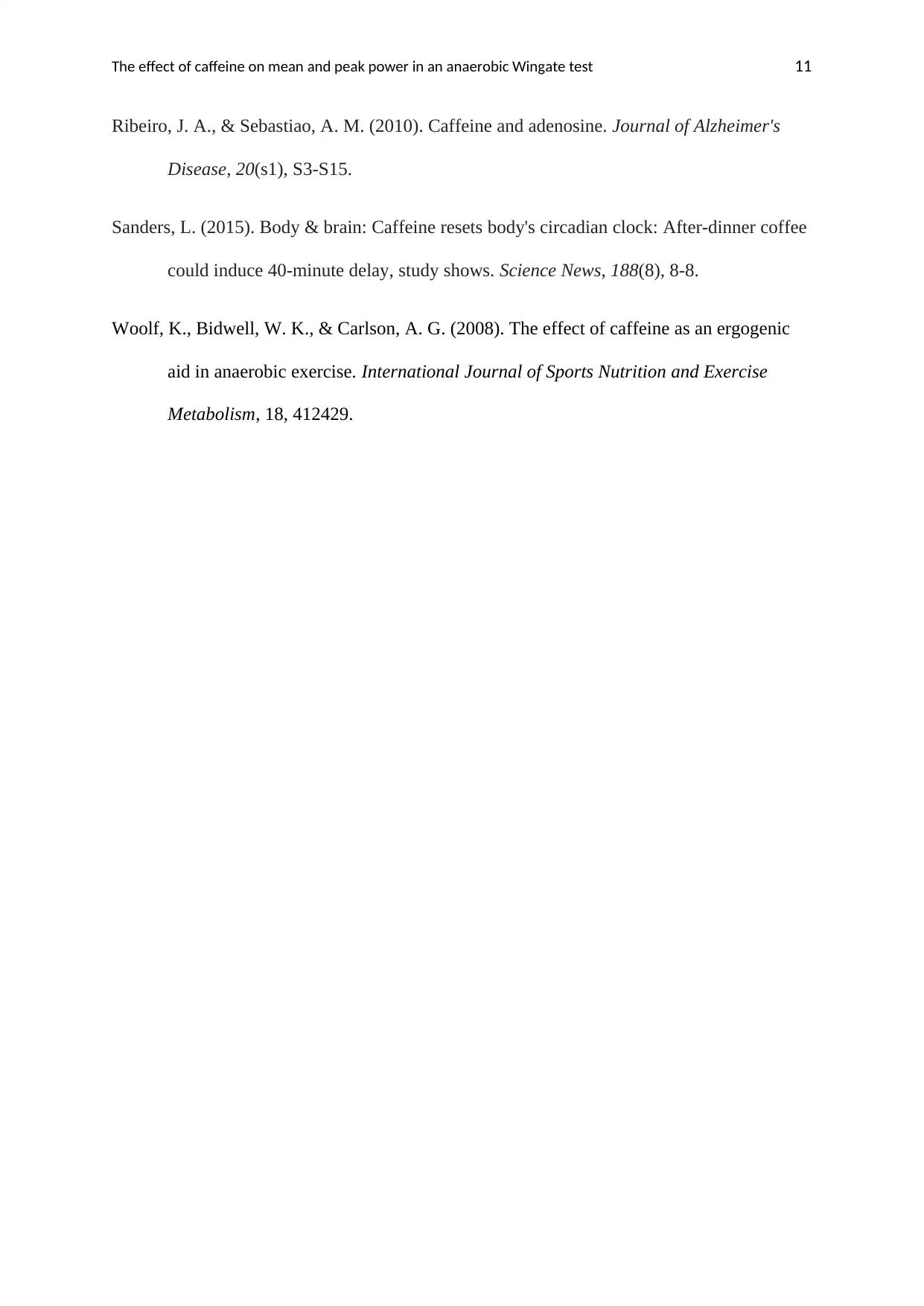
The effect of caffeine on mean and peak power in an anaerobic Wingate test 11
Ribeiro, J. A., & Sebastiao, A. M. (2010). Caffeine and adenosine. Journal of Alzheimer's
Disease, 20(s1), S3-S15.
Sanders, L. (2015). Body & brain: Caffeine resets body's circadian clock: After‐dinner coffee
could induce 40‐minute delay, study shows. Science News, 188(8), 8-8.
Woolf, K., Bidwell, W. K., & Carlson, A. G. (2008). The effect of caffeine as an ergogenic
aid in anaerobic exercise. International Journal of Sports Nutrition and Exercise
Metabolism, 18, 412429.
Ribeiro, J. A., & Sebastiao, A. M. (2010). Caffeine and adenosine. Journal of Alzheimer's
Disease, 20(s1), S3-S15.
Sanders, L. (2015). Body & brain: Caffeine resets body's circadian clock: After‐dinner coffee
could induce 40‐minute delay, study shows. Science News, 188(8), 8-8.
Woolf, K., Bidwell, W. K., & Carlson, A. G. (2008). The effect of caffeine as an ergogenic
aid in anaerobic exercise. International Journal of Sports Nutrition and Exercise
Metabolism, 18, 412429.
1 out of 11
Your All-in-One AI-Powered Toolkit for Academic Success.
+13062052269
info@desklib.com
Available 24*7 on WhatsApp / Email
![[object Object]](/_next/static/media/star-bottom.7253800d.svg)
Unlock your academic potential
Copyright © 2020–2026 A2Z Services. All Rights Reserved. Developed and managed by ZUCOL.

